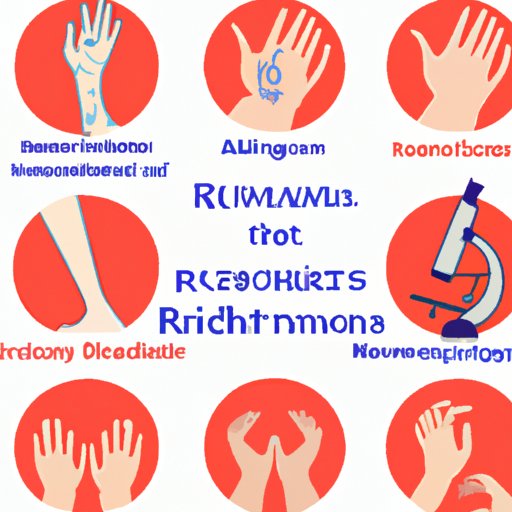
Introduction
Rheumatic diseases affect millions of people worldwide, causing chronic pain, joint stiffness, and other symptoms that can significantly impact daily life. In this comprehensive guide, we’ll explore what rheumatic diseases are, their symptoms, causes, and treatment options. We’ll also discuss the different types of rheumatic diseases and their effects on the body, debunk common myths and misconceptions around these conditions, and provide coping strategies for managing the physical and emotional impact of rheumatic diseases.
Understanding Rheumatic Diseases: Symptoms, Causes, and Treatment Options
Rheumatic diseases are a group of conditions that affect the joints, bones, muscles, and other connective tissues in the body. These conditions can cause inflammation, pain, and stiffness, making it difficult to move and perform daily activities. Common symptoms of rheumatic diseases include joint pain, swelling, and stiffness, fatigue, and muscle weakness. The causes of rheumatic diseases are not entirely understood, but genetics, environmental factors, and lifestyle choices can play a role. Treatment options for rheumatic diseases include medications, physical therapy, and lifestyle changes.
A Comprehensive Guide to Rheumatic Diseases and How to Manage Them
If you’re living with rheumatic diseases, it’s essential to understand how these conditions affect your body and how to manage the symptoms effectively. Diagnosis of rheumatic diseases typically involves a physical exam, blood tests, and imaging studies. Management options may include medications, physical therapy, and surgery in some cases. Coping with the emotional impact of rheumatic diseases can also be challenging, but there are strategies you can use to improve your mental health, including joining support groups and seeking professional help when needed.
Breaking Down the Different Types of Rheumatic Diseases and Their Effects on the Body
There are many types of rheumatic diseases, each with its symptoms and effects on the body. Osteoarthritis, rheumatoid arthritis, lupus, and gout are among the most common types of rheumatic diseases. Osteoarthritis, often referred to as “wear and tear” arthritis, typically affects older individuals and can cause joint pain and stiffness. Rheumatoid arthritis is an autoimmune disorder that causes joint inflammation and damage. Lupus is another autoimmune disorder that affects multiple organs in the body, including the joints, skin, and kidneys. Gout is a type of arthritis caused by a buildup of uric acid crystals in the joints.
Rheumatic Diseases: Debunking Common Myths and Misconceptions
There are many misconceptions around rheumatic diseases, including that they only affect older individuals and that there is nothing that can be done to manage the symptoms. However, these myths are not true. Rheumatic diseases can affect individuals of all ages and genders and can be managed with the right treatment and lifestyle changes.
Living with Rheumatic Diseases: Coping Strategies for Managing Pain and Fatigue
If you’re living with rheumatic diseases, you may experience chronic pain and fatigue, which can impact your daily life. However, there are strategies you can use to manage these symptoms effectively. These include practicing relaxation techniques, engaging in low impact exercise, and making lifestyle changes that support good physical and mental health. Additionally, there are many support resources available for individuals living with rheumatic diseases, including online support groups and advocacy organizations.

Exploring the Link Between Rheumatic Diseases and Mental Health
Living with rheumatic diseases can take an emotional toll, causing stress, anxiety, and depression. However, there is a growing body of evidence that suggests there is a connection between these conditions and mental health. Strategies for managing the emotional impact of rheumatic diseases include seeking professional help, practicing mindfulness, and engaging in activities that promote overall well-being.
Preventing Rheumatic Diseases: Lifestyle Changes and Early Detection Methods
While not all rheumatic diseases are preventable, several lifestyle changes can reduce your risk of developing these conditions. These include maintaining a healthy weight, engaging in regular exercise, and eating a balanced diet rich in fruits and vegetables. Additionally, early detection methods, such as regular screenings and check-ups with your healthcare provider, can help you catch rheumatic diseases early when they are most treatable.
Conclusion
Rheumatic diseases can be challenging to live with, but with the right treatment and lifestyle changes, it is possible to manage the symptoms and improve your overall quality of life. We hope this guide has provided you with the information, resources, and support you need to better understand, manage, and live with rheumatic diseases. For further information and support, we encourage you to reach out to your healthcare provider and organizations like the Arthritis Foundation and the Lupus Foundation of America.





